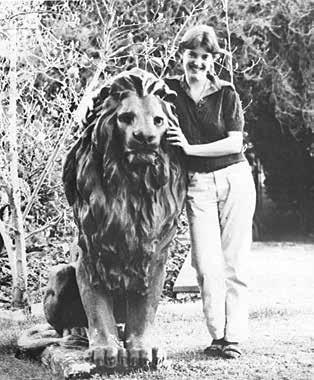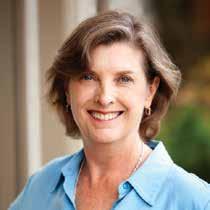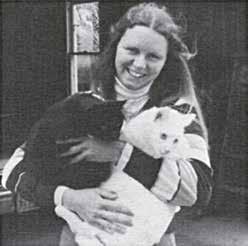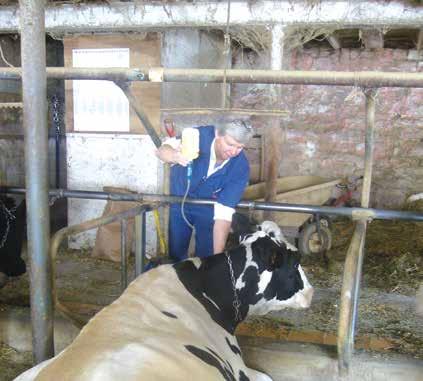
6 minute read
Dr. Linda Rhodes
Looking back at a career that has taken quite a few unexpected turns, Dr. Linda Rhodes laughs, “It was quite a ride!”
After turning down a PhD program in theoretical mathematics, she discovered a passion for veterinary medicine while living on a California commune, milking goats. However, “Back in 1973, when I was applying, most vet schools didn’t admit that many women,” Rhodes said, adding, “You had to apply in the state of which you were a resident.”
She had heard that Penn Vet was “gender neutral.” A native of New York, she moved across the state line to the small town of Hop Bottom, Pennsylvania, to become a resident while completing pre-vet courses.
At Penn Vet, “We had a number of strong women leaders, which was unusual then,” she said, pointing to Drs. Joan O’Brien, Elaine Hammel, and Jill Beech as mentors. Hammel, who was teaching field service, was “in her truck, helping cows, and that’s what I wanted to do,” Rhodes said. Even after graduating fourth in her class, Rhodes struggled to find a job as a dairy cattle veterinarian. “I had 17 interviews. I heard comments like, ‘My wife isn’t comfortable with me riding around in the truck with a woman,’ and ‘Physically women can’t do this kind of work,’” she said.

After a short, reluctant stint in a small animal practice, she was finally accepted to a clinical internship at Utah State University. She continued working locally after the internship, focusing on herd health. At the time, she was the only female large animal veterinarian practicing in Utah. Her path led back east to Cornell, where she was asked to teach part-time in the bovine palpation lab. After a sabbatical teaching embryo transfer to veterinarians in Israel, where she was the only female large animal veterinarian in the country, she was accepted to Cornell’s PhD fellowship program in physiology. “I could do research on ruminants, particularly in reproduction. I enjoyed being in the library and the laboratory again,” Rhodes said.

After earning her PhD, Rhodes pursued a new career direction: pharma. “I saw an advertisement for a pre-clinical biology research position at Merck. They were delighted with my background. There was a real need for people with broad biomedical understanding who could do research on new drug targets.”
She worked on developing human drugs using animal models. “Then, Merck formed a joint venture—an animal health division called Merial. I headed up the clinical research department, focused on drugs for cattle, which was right up my alley,” she said.

In 2001, Rhodes left Merial to co-found AlcheraBio LLC, a consulting and contract research organization [CRO] focused on the animal health industry. “By the time we sold the company, we were running clinical trials for all top 10 animal health companies in the country as well as half a dozen companies from Europe,” she explained. “We pioneered an industry. There was not a big, full-service animal health CRO in the U.S. prior to AlcheraBio.”
Rhodes was about ready to retire when she received an offer she couldn’t refuse: serving as the founding CEO, and currently, as Chief Scientific Officer at Aratana Therapeutics. “I saw this as an opportunity that would completely change the animal health industry. The venture capital investors had discovered animal health and were willing to invest. We have over 20 drugs in development. Aratana has grown exponentially,” she said.
For Rhodes, several paths in veterinary medicine have converged with remarkable synergy. And she provides guidance to women who are finding their way to leadership positions in the animal health industry. “We still need a lot of encouragement for women as they rise up in their careers and encounter less pay for equal work, for example,” she said.
Dr. Darcie Stolz
Penn Vet Class of 1982
As the commencement speaker for Penn Vet’s Class of 2009, Dr. Darcie Stolz left the graduating class with this inspiring thought: “If a girl from the suburbs, who knew nothing about agriculture, could end up being the first woman food animal practice owner in the heart of dairy country in Pennsylvania, you can do anything.”
Stolz exemplifies perseverance. Both her high school guidance counselor and college advisor strongly discouraged her from pursuing veterinary medicine as a career. But she steadfastly followed her calling. “I loved animals ever since I was a little girl,” she said.

As an undergraduate at Penn State, Stolz had every intention of becoming a small animal vet. But she volunteered at the sheep barn during lambing season, and that changed everything. Large animal medicine “was just a whole new world. I really liked the people and being outdoors. The lifestyle seemed to fit me.”
With signature stick-to-itiveness, she applied twice to Penn Vet before being accepted on her third try. “I graduated in 1982, at a time when women were still in the minority, and women interested in large animals were few and far between,” Stolz noted. “In fact, in my class of 103 students, I was the only woman who wanted to focus on bovine medicine.” she found supportive mentors at Penn Vet, going out into workplace was a different story. Many large animal practices not even grant her an interview. She finally found a job in a two-person large animal practice in Lancaster County, Pennsylvania. “I was very fortunate that once I did get hired, boss] was a good mentor and helped me get my feet on the Stolz said. had to earn the trust of the local Amish population. “My was when I saved the Amish bishop’s cow from death. catapulted my career within the Amish community,” Stolz initiated preventative herd health programs, beginning with scheduled herd checks.”
Stolz purchased the dairy, beef, and small ruminant portion practice, and she has had a thriving business since. “You’ve build up that ‘trust account’ like a bank account,” she said, “As a woman, it took longer and you had to work harder.” credits her husband for his unwavering support. The demands juggling practice ownership with raising children “take a spouse behind you 100 percent.” the Production Animal Practice Veterinarian At-Large representative to the Pennsylvania Veterinary Medical Association Board of Trustees, and she served on the American Association of Bovine Practitioners Board of Directors for six years. She presented the talk Families, Females and Food Animals: Can We Do It All? at the Association of American Veterinary Medical Colleges’ annual meeting. And she considers speaking at the Penn Vet commencement “one of the highlights of my career.”

All of this might seem impossible to a girl discouraged from pursuing a passion for veterinary medicine. But as Stolz noted in that commencement address, “Remember that even the most unlikely goals can be accomplished. I am living proof of that.”

